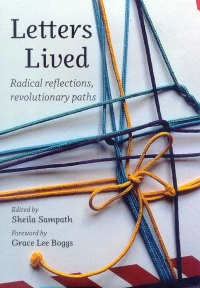| ________________
CM . . .
. Volume XXI Number 16. . . .December 19, 2014 
 |
Letters Lived: Radical Reflections, Revolutionary Paths.
Sheila Sampath.
Toronto, ON: Sumach Press/Three O’Clock Press, 2013.
131 pp., trade pbk. & ebook, $14.95 (pbk.).
ISBN 978-1-927513-15-6 (pbk.), ISBN 978-1-927513-24-8 (ebook).
Subject Headings:
Political activists-Biography.
Social reformers-Biography.
Grades 12 and up / Ages 17 and up.
Review by Joanne Peters.
*** /4
|
| |
|

excerpt:
I've started thinking recently about what it means to identify as an activist. It's almost as though activist is a certification you get when you've put in x hours of anti-oppression meetings or eaten x amounts of hummus at community meetings. I'm growing uncomfortable with this way of framing the community-based work that many of us activists do.
...activism, it isn't really a state or identity as much as it is a trajectory or path. And we all start somewhere and end up somewhere else and move at different paces. And what makes it exciting is that we never know everything; we're always going to ask and be asked some form of unfortunate question, and it's from those that we continue to grow and challenge ourselves and the world around us.
And that's where this book came from; from wanting to understand where people I admire and respect came from, how they came to shape the world around them and became the inspiring revolutionaries I know today. (From Sheila Sampath’s “Introduction”, pp. vii-ix)
A Toronto-based designer and educator, Sheila Sampath is involved in a variety of creative endeavours, amongst which is her work as Editorial and Art Director of Shameless magazine. Although I've never perused a single issue of Shameless, I get the impression that is definitely not Seventeen magazine, with its pages and pages of ads and prettified prom queen aspirants. Shameless magazine's readers are "strong, sassy young women and trans youth", and its mission is to "inspire, inform, and advocate for young women and trans youth." Not surprisingly then, in Letters Lived, Sampath has chosen contributors whose lives have been lived in the active pursuit of social justice and community-building, especially those who have faced social barriers because of their race, gender, social class, or sexual orientation. All of the contributors to Letters Lived are female: some are gay, some are straight, one has undergone gender re-assignment, and at least three identify themselves as trans (i.e. trans gender). The concept behind this compilation is that each contributor writes a letter to her much-younger teen self - someone who is around age 16 - reflecting on the years that have passed, with the perspective that time, life experience, and maturity can bring, and understanding how the passing years have challenged the writer to mature into an adult who is both the same and yet, quite different from that 16-year-old self.
For most of the contributors, 16 was anything but "sweet". Truthfully, being aged 16 isn't sweet for many teens, especially for those who differ from whatever the "norm" happens to be, in whatever community in which they happen to live. Many teens experience concern about what others (family, friends, schoolmates) think of us, concern "that the world cannot be changed" (p. 23), or the belief that one's concerns and problems are unique. Selma James reminds her younger self, "Don't ever think you're the only one who knows or understands suffering." (p. 30)
For teens who are "different" in more obvious ways, the journey through adolescence is even more painful. Those who chafe "against a world of limited possibility" because they want a future that offers more than marriage and motherhood (Shea Howell, p. 53), those who are "struggl[ing] to recognize [their] gender and sexuality for what they are" (Juliet Jacques, p. 67), those who live with an abusive parent (Rae Spoon), those who "felt estranged in the white family that [they] grew up in" (Victoria Robinson, p. 90) ultimately learn to channel their fears and anger into positive action. Music, writing, teaching, political involvement, and relationships (especially those in which sexual identity is explored and established) become the conduits through which strong and vibrant adult selves develop. But the journey is usually a difficult one, often beginning with running away from home. As adults, many of these writers speak of their "chosen home" in which they now live and thrive, the place and community in which they "Commit to living here on earth for the long haul. [Because] It gets better." (Lee Maracle, p. 123)
Despite its short length (131 pages), Letters Lived is challenging reading material. It's not a radical manifesto or a "how to be an activist" handbook, but it is intensely political, in every sense of that word. It’s a book that will attract older female readers who are interested in the politics of social justice, gender equality, and female sexuality. Male readers are just not likely to have the same sense of identification with some of the issues of which these women write. Nor is it a book for adolescents younger than 16: issues of sexual identity and exploration are discussed openly, in language which is strong, and in terms which some might find objectionable. The target audience for this book is a narrow one, but those young women interested in undertaking revolutionary paths will find inspiration in the radical reflections of the book’s contributors.
Recommended.
Joanne Peters is a retired high school teacher-librarian who lives in Winnipeg, MB.

To comment
on this title or this review, send mail to cm@umanitoba.ca.
Copyright © the Manitoba Library Association. Reproduction for personal
use is permitted only if this copyright notice is maintained. Any
other reproduction is prohibited without permission.
Next Review
| Table of Contents For This Issue - December 19, 2014.
CM Home | Back Issues
| Search
| CM Archive
| Profiles Archive
|
